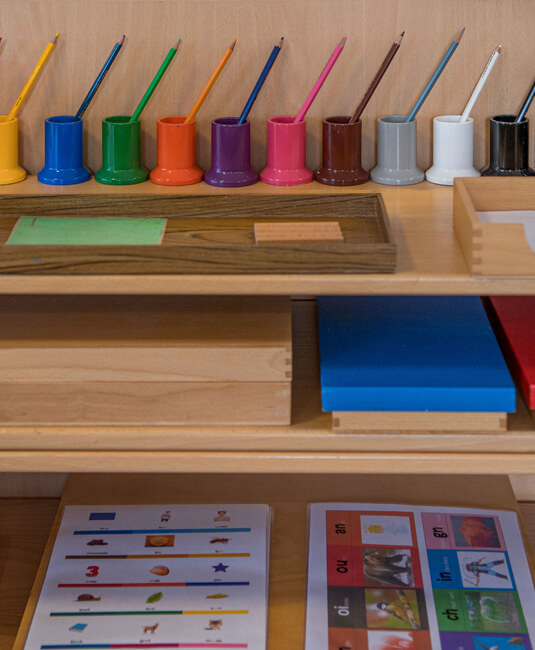The child aged 3 to 6 years is a sensory explorer who absorbs everything around him or her.
It is during this period that children develop their senses, their autonomy, their self-confidence and their confidence in adults. Thanks to the orderly environment, the child develops structured and logical thinking that facilitates the acquisition of school knowledge.
At this age, it is essential to respect the child’s rhythm, emotions and need for security.
By allowing him to evolve in a structured environment and live in a mixed age social group composed of peers with the same development plan, the child will develop his personality in harmony with his peers.
General philosophy of education
Pedagogical team
At L’Idylle Montessori School, the environment is designed to meet the specific needs of children between the ages of 3 and 6.
Learning is a positive experience which helps the child to develop in a way that respects his or her rhythm and sensitive periods. The concept of sensitive periods is a scientific phenomenon that highlights, in children aged 0 to 6, windows of opportunity limited in time when learning occurs in a spontaneous and innate way.
These periods guide the child by making him/her attracted to certain things and indifferent to others. They are phases of intense psychological development during which the child has strong special skills. If they are respected, learning is then a source of wonder and deep joy.
To support this approach, the educational activities include self-control of error, which allows the child to progress by and for himself. Error is not conveyed as a failure, but as a source of construction. Thanks to this pedagogy, the child develops a solid self-confidence, supported by the development of autonomy.
We aim to make children responsible. The multi-age group promotes cooperation and solidarity rather than competitiveness. The youngest children observe the older ones, who themselves help the younger ones. This is the birth of the toddler society. A cohesive society where social development is important.
The posture of the adult carries this vision of an education adapted to the child by taking a new look at the child without ever judging him or her. The adult must transmit to the child “I trust you”, be present when necessary and know how to stand back when the child reaches concentration so as not to become an obstacle in the child’s development.
Our entire philosophy follows the great goal of Maria Montessori’s work, which is Education for Peace !
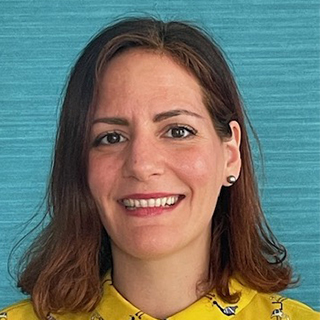
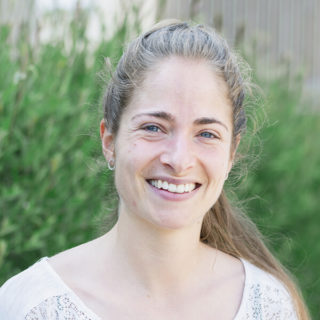
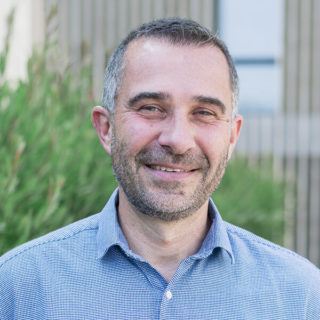
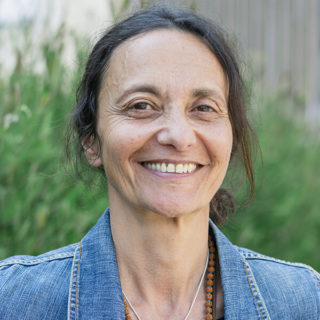
Typical day at Montessori Idylle School
- Reception takes place between 8am and 9am.
- The departure of children registered in the morning (minimum registration of 5 mornings) takes place between 11:45 and 12:00.
- The children registered for the day prepare the meal brought by a caterer and the tables as in the restaurant.
- Afternoon children leave between 2.45 and 3.00 pm.
- Extracurricular activities are offered from 3pm to 6pm.
The pedagogical material
The activities in the atmosphere give the child the opportunity to start the path to self-education.
The role of the teachers is to guide the child by allowing him or her to build up through concrete experiences, by manipulating the material. For children from 3 to 6 years old we have about 200 activities that accompany them in their learning.
The objects of the scientific teaching material are beautiful, real, breakable and meet the needs of development.
They attract the child and allow him to find the activity which will fix his attention, enter into a cycle of repetition and bring him towards concentration. All the material is adapted to the size and strength of the child, which allows him/her to correct him/herself and therefore to be able to work independently (once the activity has been presented).
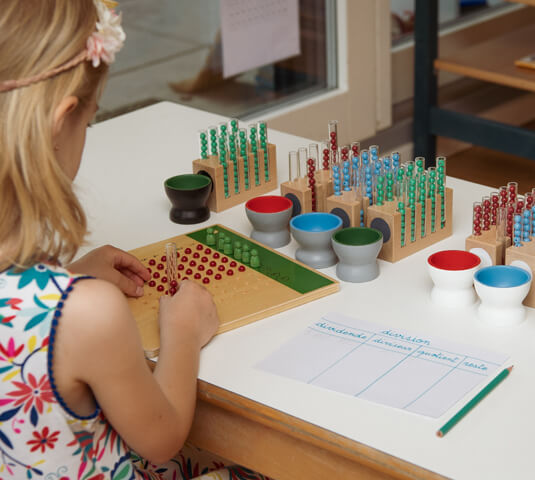
The atmosphere is organised in 4 zones, one for each material area: practical life, sensory, mathematics and language.
In each area, the material is arranged on the shelves in a logical order; from the simplest to the most complex activities.
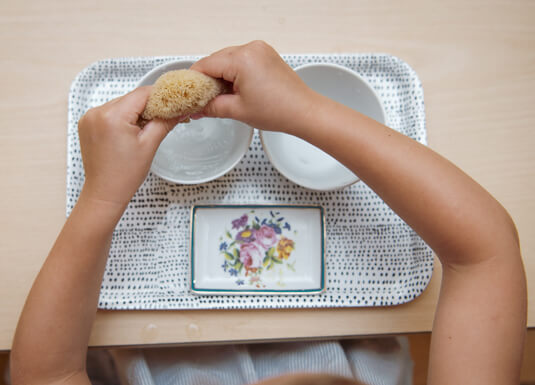
At the age of around 3 years old, the child will have access to practical life activities as they go along.
This material will generate activity in the child and will allow the phenomenon of concentration, a pillar of human intelligence and social development, to emerge.
It will allow the child to enter into real life while offering the opportunity for decontextualised actions.
Its aim is to allow the child to develop his occult-motor coordination, his intelligence and to adapt to his time, space and culture.
This material is described as the development of materialised abstractions.
Through sensory and motor experiences, the origin of the creation of mental images will gradually take shape. The child will be able to experience concepts with his body and senses.
This sensory material will connect the child with what, by definition, does not exist, i.e. the concept. Sensory activities accompany the child on the path to abstraction. This path is made in several stages :
- sensory appropriation of a concept,
- name of the concept (entry into the cultural world),
- the child can create an image, a mental representation.
The child will then be able to generalise this mental image in his or her environment.
A geography workshop allows the child to discover the world through a sensory approach of the globe, to learn about continents, countries, capitals, flags in order to nourish his spirit of curiosity.
The sensory material is universal, scientific and as soon as possible constructed on the basis of the decimal system.
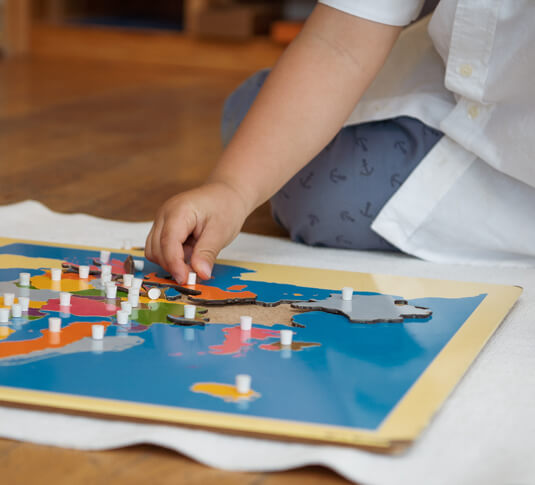
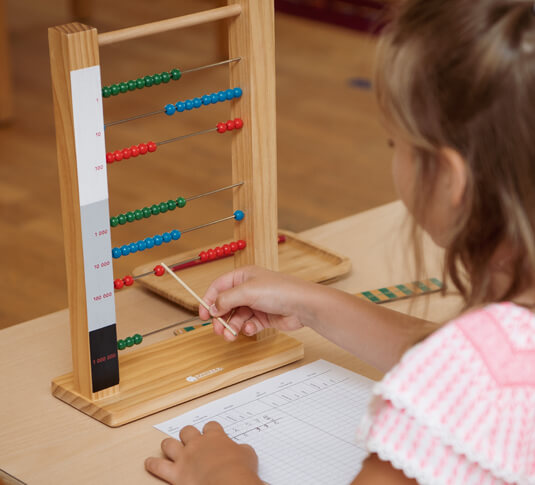
The mathematical mind is a specificity of the human being. Thanks to it the child will be able to order, classify, compare and evaluate the world.
Allowing the child to enter the world of mathematics means allowing him to enter the complex codes that humanity has taken a long time to develop.
This will enable him to build his capacity to analyse and synthesise.
To know how to read is not only to be able to decipher letters and words, it is to have access to the idea, to the thought of what lies behind the medium that is words.
And to write is to give visible form to our thought so that the other can access it.
Language material leads the child towards this notion of enriching his or her capacity to tell the world, beyond a purely mechanical learning process.
With Montessori pedagogy, the learning of writing precedes that of reading.
Initially the child is only a writer. Writing gives rise to bodily movement whereas reading is a purely mental movement. When the child writes, he externalises what he has in his head, whereas reading is accessing the thoughts of others and therefore being aware that others can project their thoughts. The child needs to experience it for himself and then he will be able to imagine that others can do it.
This learning phase will be the only time in life when the child will experience the separation of the two movements. Moreover, these learning processes do not remain separated for very long.
Knowledge of the living environment is deepened through outdoor activities with the observation of fauna and flora. All the observations are supported and taken up by material in the classroom. The child constantly makes the link between the real world and his theoretical learning.
On a daily basis, we make sure that the children are aware of this by involving them in the life of the school and by teaching them, for example, how to sort waste, how to use compost, how to respect nature and take care of living beings.
Maria Montessori demonstrates the importance of distinguishing between imagination and fantasy.
In our school, the teachers accompany the child on the path to creativity by giving him/her cultural and observational support. In this way the child nourishes his construction of the world and his capacity for imagination will be all the greater.
Artistic activities are in place in the atmosphere and the child can experiment with different techniques and media. Through these works the child develops his personality.
We also have music and psychomotricity activities.
